W D Brumbaugh*
| Prologue. WD, born in 1906 to Grandmother Carrie Brumbaugh and WD Brumbaugh Sr., both Greenville High School graduates. Grandmother, had been a schoolteacher. WD Sr., in his early days was a schoolteacher, then county surveyor and attorney. Like Dad, he was a Democratic County Chairman and a delegate to the Democratic National Convention. WD had the best of parental education. Home on S. Washington St., one block from the train station. (When I was a child, Santa Claus would arrive at the station by train at Christmas.). It was a middle-class neighborhood. I knew all the neighbors and many schoolmates. Now a disaster! From his first days, the First World War, the roaring 20's, and the Great Depression, the Second World War, best of times 50's, WD lived it all. He had a wonderful country law practice, a number of successful businesses, and headed a number of local organizations. He was a superb family tour guide. The best of marriages and a wonderful father. | 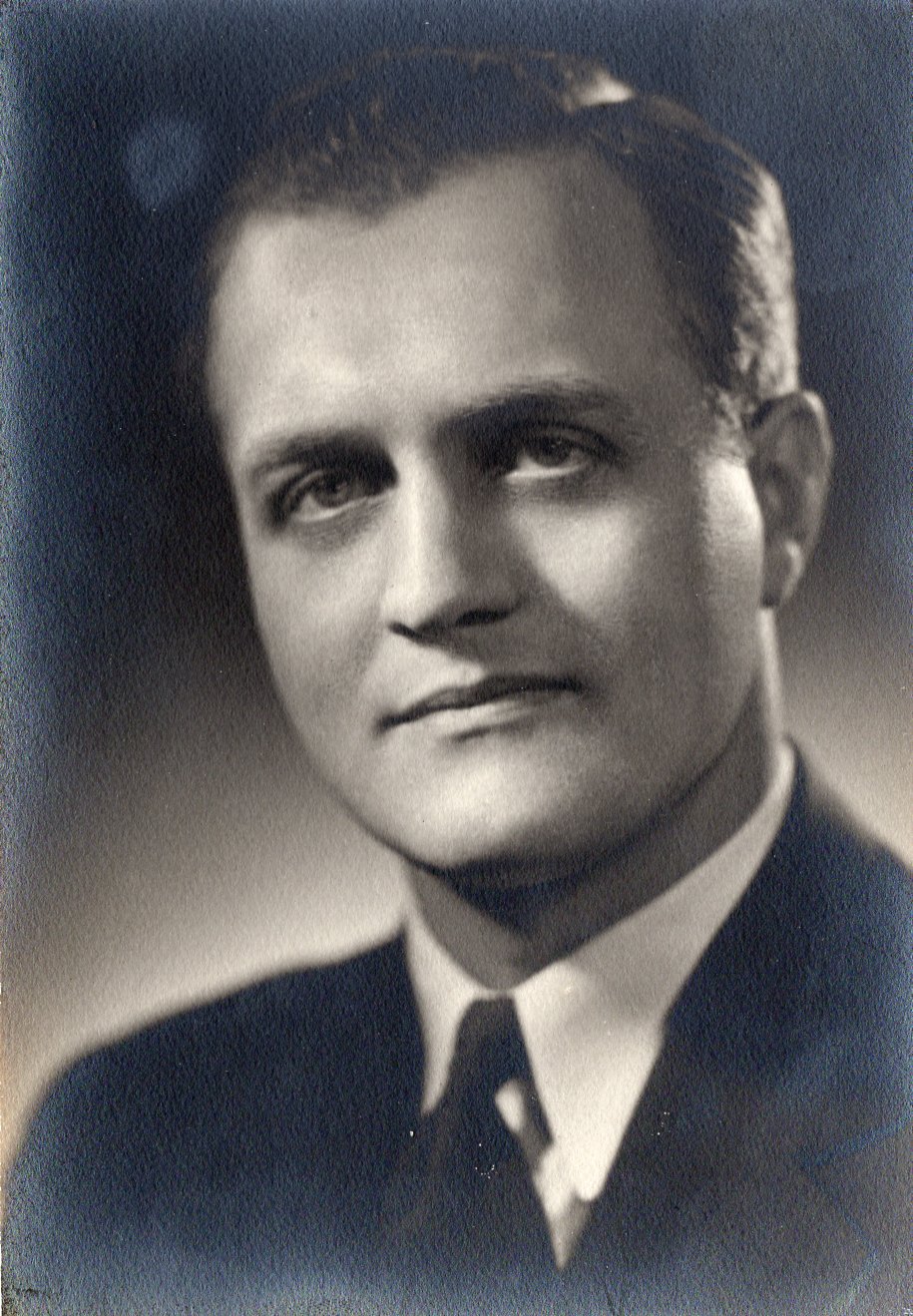 |
|---|
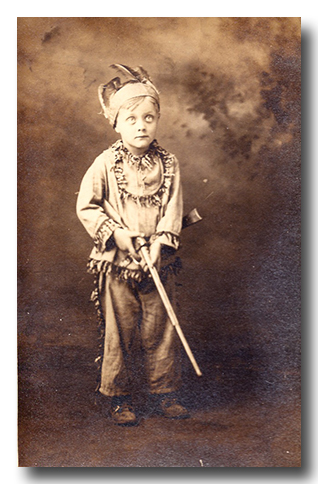 I) The Early Days. His brother Laird, 10 years older, died at the age of 18. Nina his older sister attended Pratt University in New York, married Uncle Walter and lived in Columbus. Younger brother, Uncle Herman, lived in Greenville, a delightful character. Grade school at the South School. His high school years set the stage for his long successful career. (Must see Greenville High School, The Chief, annual high school yearbook.) He played football, played clarinet in the school orchestra, and sang in the choir. Interestingly, his class of 1924 comprised 122 students. My class of 1955 was 150 students. (Like I experienced, Dad had friends who became highly successful. His best friend, Gus Wenger, classmate at Greenville, roommate at University of Michigan. Gus had a PhD from Yale. Later, Dean of the Psychology Department at the University of California. (All campuses). (Small world- Peter, Landon eighth grade, was beat out for quarterback by Todd Briar, Gus Wenger’s grandson.) Classmate, friend and Mother's cousin, Bill Patty, Princeton, Phi Beta Kappa, Harvard Law Review, managing partner of the largest law firm in New York, Sherman and Sterling. (After law school he offered me a job but also gave me some great advice). Another classmate, Margaret Brown, Mother's favorite cousin. She married Dr. Ullery, Ohio State football and Dean of the Ohio State Medical School; worst of stories.) Dad's Greenville High School years were very much like mine, great teachers, many successful classmates from professors to farmers. Not so today!
I) The Early Days. His brother Laird, 10 years older, died at the age of 18. Nina his older sister attended Pratt University in New York, married Uncle Walter and lived in Columbus. Younger brother, Uncle Herman, lived in Greenville, a delightful character. Grade school at the South School. His high school years set the stage for his long successful career. (Must see Greenville High School, The Chief, annual high school yearbook.) He played football, played clarinet in the school orchestra, and sang in the choir. Interestingly, his class of 1924 comprised 122 students. My class of 1955 was 150 students. (Like I experienced, Dad had friends who became highly successful. His best friend, Gus Wenger, classmate at Greenville, roommate at University of Michigan. Gus had a PhD from Yale. Later, Dean of the Psychology Department at the University of California. (All campuses). (Small world- Peter, Landon eighth grade, was beat out for quarterback by Todd Briar, Gus Wenger’s grandson.) Classmate, friend and Mother's cousin, Bill Patty, Princeton, Phi Beta Kappa, Harvard Law Review, managing partner of the largest law firm in New York, Sherman and Sterling. (After law school he offered me a job but also gave me some great advice). Another classmate, Margaret Brown, Mother's favorite cousin. She married Dr. Ullery, Ohio State football and Dean of the Ohio State Medical School; worst of stories.) Dad's Greenville High School years were very much like mine, great teachers, many successful classmates from professors to farmers. Not so today!
II). Ann Arbor to Columbus. Dad graduated from University of Michigan in 1928,
He and roommate Gus Weinger played in the Michigan Marching Band. He joined the DU fraternity. (Always a Michigan fan, he took me to Michigan to see a national championship, 1949 Michigan team defeated Ohio State). He then attended Ohio State Law School and was admitted to the Ohio State Bar, 1931. He loved Columbus. His friends at the law school became top attorneys in Columbus. Two of his best friends founded the law firm of George, Greek, King, and McMahon. (This was the firm I worked for after law school). Mr. Greek and his wife were Dad and Mother's best friends out of Greenville friends in both Columbus and Naples, Florida. Their son, Sonny, was my childhood friend, Stanford Law graduate. (He joined the firm while I was there.) Mr. George was also a great friend and my mentor. Another W D classmate was an Ohio Supreme Court Justice. At Dad’s request, he administered the oath when I was admitted to the Ohio State Bar. Paul McNamara, very close friend and founder of another top law firm in Columbus. He was the Chairman of the Board of Miami University of Ohio. Very helpful to me in Columbus and later helped Bill Brown become chief doctor at Miami University Hospital. His daughter, Launa was at Vassar when I was at Princeton. Dad had the best of connections in Columbus. (Dad’s Uncle having been the Congressman Brumbaugh, helpful?)
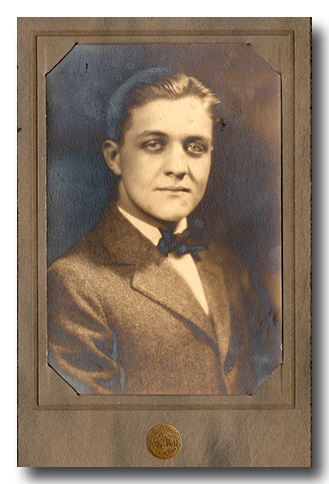
III). Back to Greenville. After law school, Dad worked as an attorney for a a local company in Columbus. It’s not clear whether he had returned to Greenville before or after he married Mother. In Greenville, he joined his father in the law practice, Brumbaugh and Brumbaugh. (Small world! There was another firm Brumbaugh, Brumbaugh and Brumbaugh, where the two sons were also going to Michigan). While he and Mother knew each other from high school, it’s not clear when they became romantically involved. After Mother’s incredible 1932 family tour of Europe, she returned to Greenville and was a kindergarten teacher.
V). Magic Moment! (Not without risk!). They eloped! They went on a date to Cincinnati to the Symphony. (Ohio required a blood test and a three day wait before marriage. Kentucky was 30 minutes over the bridge, find a justice of the peace, marriage in 20 minutes.). After the Symphony, they "crossed over the bridge", married. Then back over the bridge to Cincinnati’s finest hotel, the Netherland Plaza. 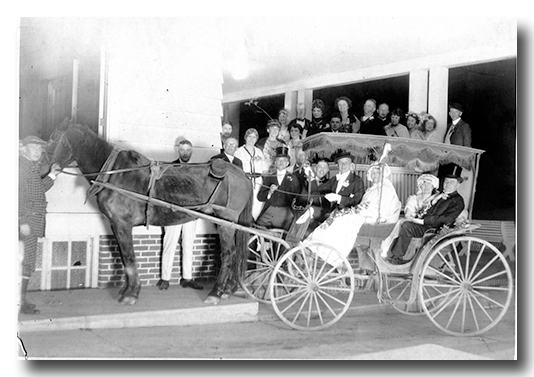 (The Risk). Granddad Coppock was the Chairman of Board of the Federal Land Bank for the Midwest, headquartered in Louisville, Kentucky. He and Grandmother, returning from Louisville to Greenville the same evening, decided to to stay at the Netherland Plaza Hotel. So lucky! News of the event did not reach Granddad for two days!
(The Risk). Granddad Coppock was the Chairman of Board of the Federal Land Bank for the Midwest, headquartered in Louisville, Kentucky. He and Grandmother, returning from Louisville to Greenville the same evening, decided to to stay at the Netherland Plaza Hotel. So lucky! News of the event did not reach Granddad for two days!
The Marriage Celebration. The parents, Brumbaughs and Coppocks, did the right thing. Wonderful ceremony at Greenville Country Club. Dad and Mother then moved into a house two blocks from Granddad's on W 4th St. They then built the house in the Park. We moved there in 1939. (The Park, the beginning of my story.
V). Dad's Career - The War Years. My first memory, Pearl Harbor. Dad told me to be quiet and listen to Pres. Roosevelt's speech "The Day That Will Live in Infamy". Dad was nearly 36. One could not enlist in the military if over 36 years old. He took the train to Washington DC to enlist in the Navy as a military attorney. The Navy had a strict policy. You could not join the Navy in any capacity if color blind. Dad was quite color blind. He could not distinguish between red and green. Rejected! During the war years, Dad served on many local committees, helped with the war effort in Greenville. We had a large victory garden. Dad had me listen every night to the radio, I especially remember the battle of Stalingrad! Most of all, i remember church bells ringing the day Germany surrendered.
VI). Warren Stores. In 1946, possibly with Granddad Coppock's assistance, he acquired a locally owned business, Warren Stores. It was a chain of 25 - 10 Cent Stores. These types of stores were in every town in the country. (There were three competing 10 cent stores within four blocks on Broadway in Greenville). They sold everything from candy to clothes to stationary to school supplies to ornaments. Dad built the company to about 35 stores. Seven were in Dayton, one in Columbus, one in Oxford Ohio, one in Union City, Indiana, then all the other small towns, Greenville, Celina, Sidney Arcanum and many other small towns in Western Ohio. It had a large warehouse a half block from Greenville Town Square. (I worked in the warehouse with Cliff Elliott, preparing inventories and supplies to be shipped to the stores. I rode with Norman, the company truck driver, taking the supplies to the stores. Often on Saturday nights, Dad and Mother, Hilda, Martha and I would go to one of the stores to relieve the manager. Wonderful experiences. Dad contracted bladder cancer in 1950 and sold the company. Dad’s “accidental” timing for the sale turned out to be brilliant. The first shopping mall had just been built east of Bexley in Columbus, Ohio. Within a few years, shopping malls were destroying small town Main Streets and especially 10 Cent Stores!
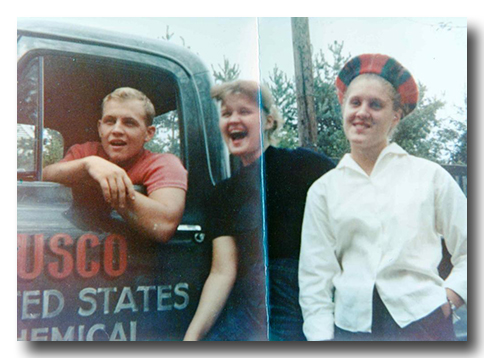
VII). United States Chemical Company. In the mid-50's, Dad purchased another locally owned business, the United States Chemical Company. It had a small warehousein eastern Greenville. It sold janitor supplies and janitor equipment to businesses and high schools across western Ohio and parts of eastern Indiana. George Stevens, Dad’s second cousin who had been Dad’s CEO for the Warren Stores was made president. They built the business. They then constructed a larger warehouse facility south of town. Dad sold 50% interest to Mr. Stevens nephew, Bill Blaine. He managed the company until Dad sold his remaining share to Bill. Bill became my close friend and was on the Board of the bank with me.
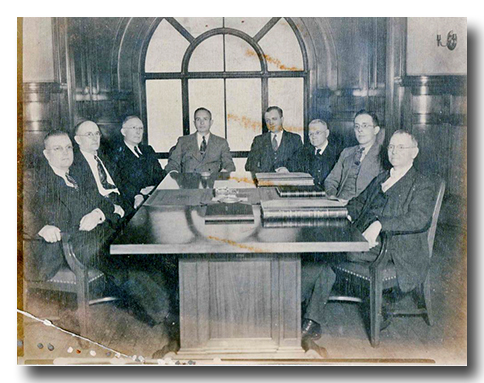
VIII). Second National Bank. Dad became a member of the Second National Bank in the 1930's. (We had a combined 70 years of service). Dad owned about 15% of the bank. Harry Stevens, George's brother, was CEO. The bank was the oldest and largest bank in the county. After the Second World War, the Board of Directors feared another depression. It invested in long-term United States government bonds. (If they had to mark these bonds to market, their current market value then was so low that under current rules the bank would have been forced to declare bankruptcy.) When Dad was in his last years, he asked me to take his place on the Board. After Dad died, I acquired significant blocks of stock for myself and the family at greatly discounted prices. I became Chairman of the Bank Holding Company. With the help of good, new board members and after three presidents, the bank was back in business and became quite prosperous. Dad gave me a wonderful opportunity. ( I was quite proud of the fact that with Marv Stamen as president of the bank for a number of years until it was sold, it was ranked number one in its peer group for the state of Ohio and always in the top 20 in the United States. Ironically, cousin Bill Hole had succeeded his father, Uncle Edward as Chairman of the second biggest bank, the Greenville National Bank).
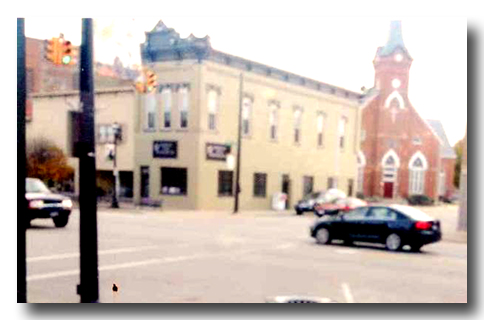 IX). Brumbaugh and Brumbaugh. Above all, Dad loved the practice of law. He bought his own office building. Over the years he had many partners. The best was Howard Ely, who then became County Common Pleas Judge. Burke Worcester’s last partner became my good friend and served with me on the Second National Bank Board. During the early years he was head of the Darke County Bar Association. He declined an opportunity to be Common Pleas Judge. As a country lawyer he had his own rules. I remember, if you were poor he wouldn’t charge you or you could bring him some farm product; chicken or vegetables. Before he would represent a client in a divorce case, he required the couple to spend three days trying to remedy the domestic situation. He did represent a large number of agricultural interests in the the county. He was a country lawyer dealing mostly in real estate transfers and contract problems. Unlike today, there was little if any serious crime. He was able to practice law in the most civil environment. Best of times!
IX). Brumbaugh and Brumbaugh. Above all, Dad loved the practice of law. He bought his own office building. Over the years he had many partners. The best was Howard Ely, who then became County Common Pleas Judge. Burke Worcester’s last partner became my good friend and served with me on the Second National Bank Board. During the early years he was head of the Darke County Bar Association. He declined an opportunity to be Common Pleas Judge. As a country lawyer he had his own rules. I remember, if you were poor he wouldn’t charge you or you could bring him some farm product; chicken or vegetables. Before he would represent a client in a divorce case, he required the couple to spend three days trying to remedy the domestic situation. He did represent a large number of agricultural interests in the the county. He was a country lawyer dealing mostly in real estate transfers and contract problems. Unlike today, there was little if any serious crime. He was able to practice law in the most civil environment. Best of times!
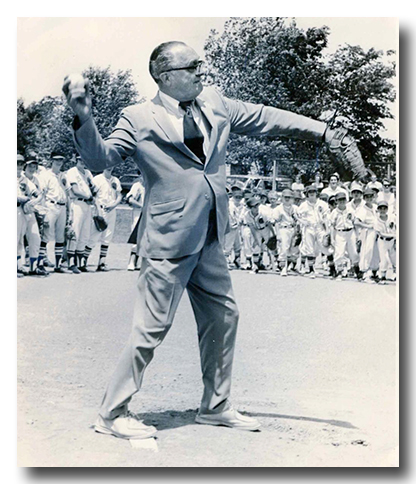 IX). Mr. Greenville. In many ways Dad was one of the most popular people in town. At his funeral, hundreds attended. While as a lawyer, he had many clients he never charged and many people he helped. He was head of the Rotary Club. He had been Chairman of the Bar Association. He was Chairman of the Democratic Party for Darke County for a number years, delegate to the Democratic Convention in 1952. He and Mother donated a large sum to the Coppock Wing of the hospital. He was the founder of the Darke County Historical Society. He and Granddad Coppock were largely responsible for the founding of the Garst Museum. They gave the lands and Granddad gave the money for the Masonic Temple. Dad gave a couple of the baseball diamonds in East Greenville and many other contributions to the city and the county. (Must see his obituary).
IX). Mr. Greenville. In many ways Dad was one of the most popular people in town. At his funeral, hundreds attended. While as a lawyer, he had many clients he never charged and many people he helped. He was head of the Rotary Club. He had been Chairman of the Bar Association. He was Chairman of the Democratic Party for Darke County for a number years, delegate to the Democratic Convention in 1952. He and Mother donated a large sum to the Coppock Wing of the hospital. He was the founder of the Darke County Historical Society. He and Granddad Coppock were largely responsible for the founding of the Garst Museum. They gave the lands and Granddad gave the money for the Masonic Temple. Dad gave a couple of the baseball diamonds in East Greenville and many other contributions to the city and the county. (Must see his obituary).
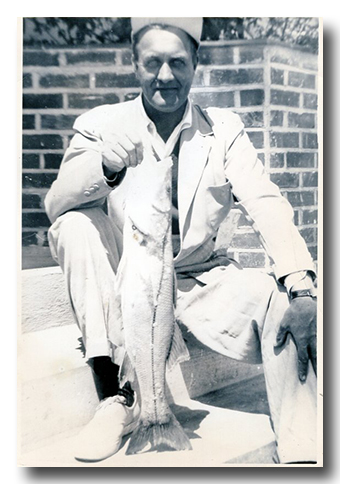
X). The Good Life. In 1950, after Dad was cured of cancer, we spent the winter in Naples, Florida. After that, Dad and Mother continued to spend all of their winters in Naples. Mother was there every year until she was 96. Many visits, many wonderful times in Naples. Dad was at his very best as the family tour guide. To Europe on the SS United States, trips as children to Washington, Chicago etc. My sisters and I enjoyed many great “Out Of Greenville” experiences! The good life ended at the age of 75, ended too early. The best of times!
| Photogallery | Obituary |
|---|
| Index |